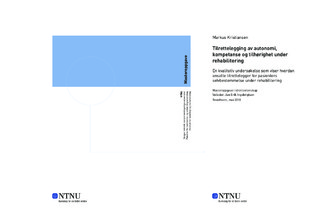| dc.description.abstract | The purpose of this study was to gain an understanding of how employees arrange for patients´ self-determined motivation under rehabilitation. In this study, the facilitating from physiotherapists and occupational therapist in regard to their patients will be discussed. The study took place in Sunnaas Hospital under the department of “Rehabilitation with work as a goal”.
This thesis has studied how employees arrange for self-determined motivation in their patients, with Deci and Ryans (1985) Self Determination Theory (SDT) as a framework. One of the subcategories in SDT called Basic psychological needs theory (BPNT) is important to the current study. This subcategory is the foundation of which the current thesis is structured and discussed, where the human needs for autonomy, competence and relatedness are the key components.
“Many models of intervention and change have suggested that the practitioner-patient relationship is an important medium and vehicle of change. In health care this is especially so, as vulnerable individuals, often lacking in technical expertise, look for the inputs and guidance of professionals. In this process a sense of being respected, understood, and cared for is essential to forming the experiences of connection and trust that allow for internalization to occur" (Ryan, Patrick, Deci, & Williams, 2008, p. 3). Ryan and Deci (2000) have studied autonomous forms of motivation against extrinsic forms of motivation. They looked at both types of motivation in physical activity where both had the same level of perceived competence. The findings show that autonomous forms of motivation indicate more interest, excitement, trust, improved performance, stamina, creativity, increased vitality, confidence and general wellbeing. The patients´ cooperation with professionals is assumed crucial for the success of the rehabilitation.
Individual interviews were done on the basis of an interview guide. The type of interview that was chosen for this study was semi-structured interview. The informants explained that active work with the patients´ self-determined motivation led the patients to gain better chance of continuing the rehabilitation after their stay. When the patients experience autonomy in their own rehabilitation and autonomous support from their physiotherapists and occupational therapists, this contribute to the necessary change. Basic psychological needs belong together in this process and they are all important to achieve changes. | nb_NO |
